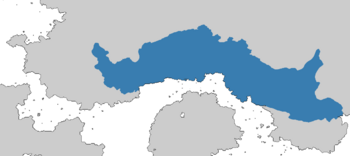Pachayanid Empire: Difference between revisions
Jump to navigation
Jump to search
Content added Content deleted
(Created page with "{{Infobox former country |native_name = Partā <!-- Name in a modern syntax of native language(s). Leave blank if name is only in English. Separate with line breaks<br/> or use Template:Plainlist. If language uses Latin characters, place name(s) in italics. --> |conventional_long_name = Pachayanid Empire <!-- Full name in English --> |common_name = Pachayanid Empire <!-- Name to be used in constructing links and catego...") |
No edit summary |
||
| Line 150: | Line 150: | ||
The '''Pachayanid Empire''' ([[High Angkat language|High Angkat]]: ''Partā'', {{small|lit.}} 'The Nation') was an ancient empire founded by [[Pachayan the Great]] in 1717 CY, also known as the '''First Eran Empire'''. |
The '''Pachayanid Empire''' ([[High Angkat language|High Angkat]]: ''Partā'', {{small|lit.}} 'The Nation') was an ancient empire founded by [[Pachayan the Great]] in 1717 CY, also known as the '''First Eran Empire'''. |
||
| + | |||
| + | ==Etymology== |
||
| + | ==History== |
||
| + | ==Government== |
||
| + | ==Military== |
||
| + | ==Culture== |
||
| + | ===Languages=== |
||
| + | ===Customs=== |
||
| + | ===Religion=== |
||
| + | ===Art and architecture=== |
||
| + | ==Legacy== |
||
| + | ==Gallery== |
||
| + | ==See also== |
||
| + | |||
| + | [[Category:Countries]][[Category:Ashnan]][[Category:Former countries]] |
||
Revision as of 10:33, 31 July 2023
Pachayanid Empire Partā | |||||||
|---|---|---|---|---|---|---|---|
| 1717 CY–2213 CY | |||||||
 The Pachayanid Empire at its greatest territorial extent, under the rule of Name I (X–Y CY) | |||||||
| Common languages | High Angkat
See: Languages | ||||||
| Government | Monarchy | ||||||
| King | |||||||
• 1717 – 1734 CY | Pachayan the Great | ||||||
| History | |||||||
• Established | 1717 CY | ||||||
• Fall | 2213 CY | ||||||
| |||||||
| Today part of | |||||||
The Pachayanid Empire (High Angkat: Partā, lit. 'The Nation') was an ancient empire founded by Pachayan the Great in 1717 CY, also known as the First Eran Empire.